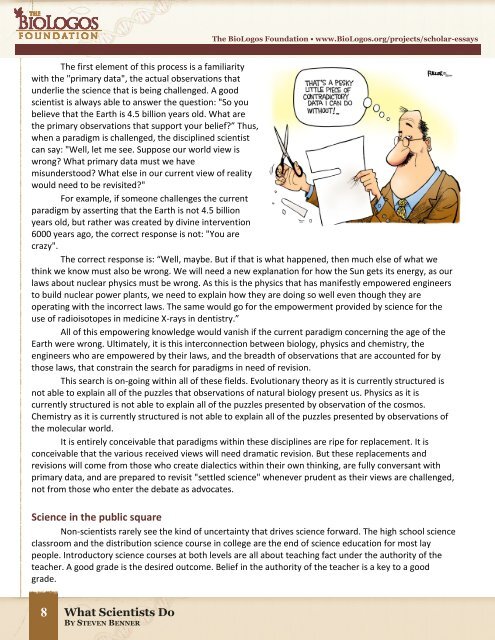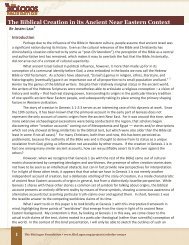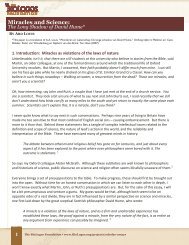What Scientists Do In this scholarly essay, Steve Benner - BioLogos
What Scientists Do In this scholarly essay, Steve Benner - BioLogos
What Scientists Do In this scholarly essay, Steve Benner - BioLogos
You also want an ePaper? Increase the reach of your titles
YUMPU automatically turns print PDFs into web optimized ePapers that Google loves.
The <strong>BioLogos</strong> Foundation • www.<strong>BioLogos</strong>.org/projects/scholar-<strong>essay</strong>s<br />
The first element of <strong>this</strong> process is a familiarity<br />
with the "primary data", the actual observations that<br />
underlie the science that is being challenged. A good<br />
scientist is always able to answer the question: "So you<br />
believe that the Earth is 4.5 billion years old. <strong>What</strong> are<br />
the primary observations that support your belief” Thus,<br />
when a paradigm is challenged, the disciplined scientist<br />
can say: "Well, let me see. Suppose our world view is<br />
wrong <strong>What</strong> primary data must we have<br />
misunderstood <strong>What</strong> else in our current view of reality<br />
would need to be revisited"<br />
For example, if someone challenges the current<br />
paradigm by asserting that the Earth is not 4.5 billion<br />
years old, but rather was created by divine intervention<br />
6000 years ago, the correct response is not: "You are<br />
crazy".<br />
The correct response is: “Well, maybe. But if that is what happened, then much else of what we<br />
think we know must also be wrong. We will need a new explanation for how the Sun gets its energy, as our<br />
laws about nuclear physics must be wrong. As <strong>this</strong> is the physics that has manifestly empowered engineers<br />
to build nuclear power plants, we need to explain how they are doing so well even though they are<br />
operating with the incorrect laws. The same would go for the empowerment provided by science for the<br />
use of radioisotopes in medicine X-rays in dentistry.”<br />
All of <strong>this</strong> empowering knowledge would vanish if the current paradigm concerning the age of the<br />
Earth were wrong. Ultimately, it is <strong>this</strong> interconnection between biology, physics and chemistry, the<br />
engineers who are empowered by their laws, and the breadth of observations that are accounted for by<br />
those laws, that constrain the search for paradigms in need of revision.<br />
This search is on-going within all of these fields. Evolutionary theory as it is currently structured is<br />
not able to explain all of the puzzles that observations of natural biology present us. Physics as it is<br />
currently structured is not able to explain all of the puzzles presented by observation of the cosmos.<br />
Chemistry as it is currently structured is not able to explain all of the puzzles presented by observations of<br />
the molecular world.<br />
It is entirely conceivable that paradigms within these disciplines are ripe for replacement. It is<br />
conceivable that the various received views will need dramatic revision. But these replacements and<br />
revisions will come from those who create dialectics within their own thinking, are fully conversant with<br />
primary data, and are prepared to revisit "settled science" whenever prudent as their views are challenged,<br />
not from those who enter the debate as advocates.<br />
Science in the public square<br />
Non-scientists rarely see the kind of uncertainty that drives science forward. The high school science<br />
classroom and the distribution science course in college are the end of science education for most lay<br />
people. <strong>In</strong>troductory science courses at both levels are all about teaching fact under the authority of the<br />
teacher. A good grade is the desired outcome. Belief in the authority of the teacher is a key to a good<br />
grade.<br />
8<br />
<strong>What</strong> <strong>Scientists</strong> <strong>Do</strong><br />
BY STEVEN BENNER




